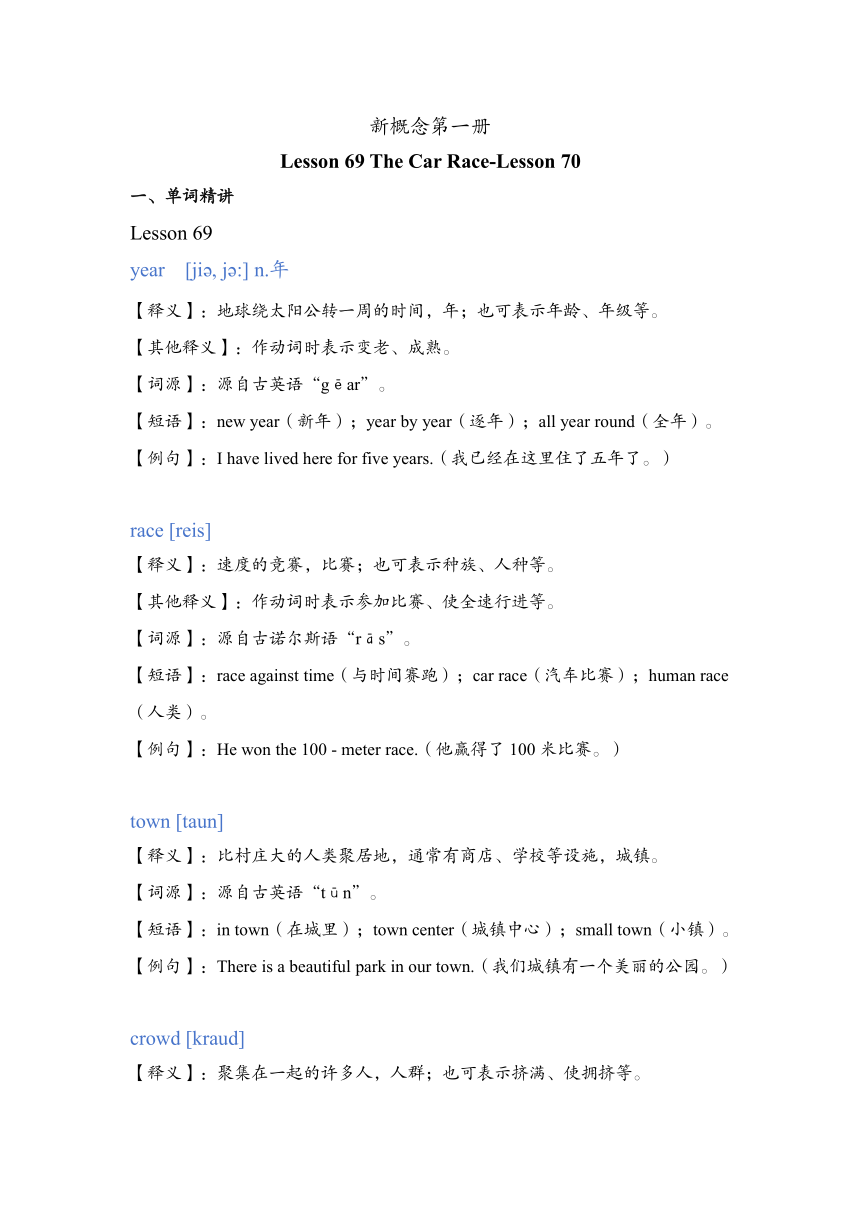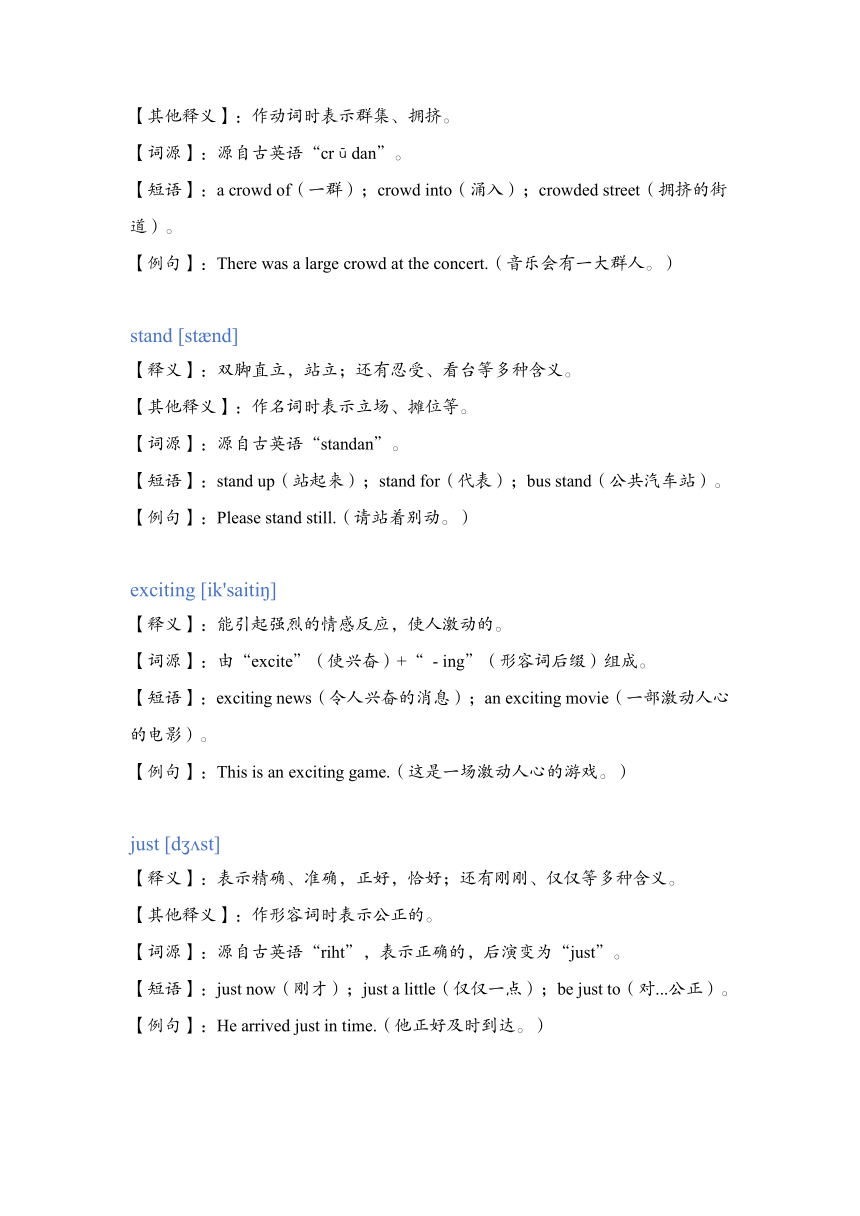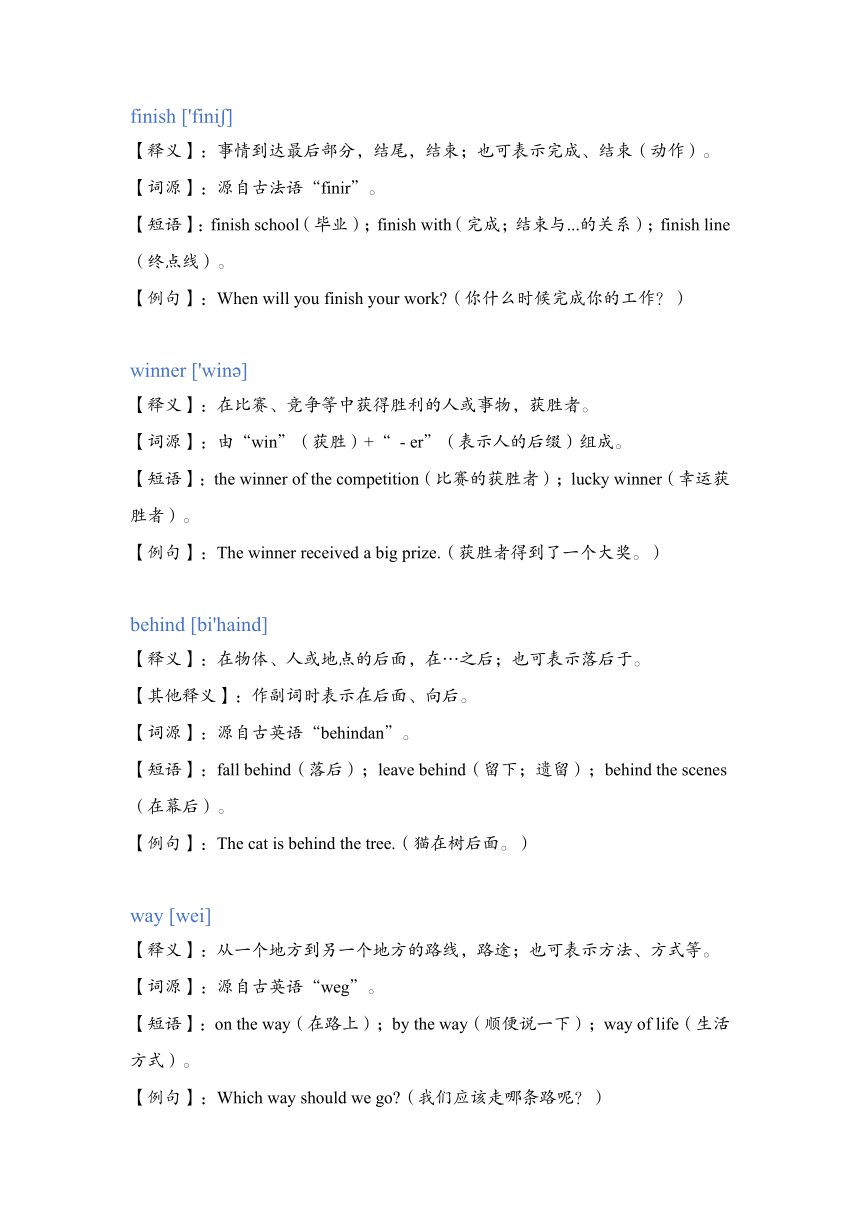新概念第一册Lesson 69 The Car Race-Lesson 70讲义
文档属性
| 名称 | 新概念第一册Lesson 69 The Car Race-Lesson 70讲义 |  | |
| 格式 | docx | ||
| 文件大小 | 128.2KB | ||
| 资源类型 | 教案 | ||
| 版本资源 | 新概念英语 | ||
| 科目 | 英语 | ||
| 更新时间 | 2024-12-03 09:55:52 | ||
图片预览




文档简介
新概念第一册
Lesson 69 The Car Race-Lesson 70
单词精讲
Lesson 69
year [ji , j :] n.年
【释义】:地球绕太阳公转一周的时间,年;也可表示年龄、年级等。
【其他释义】:作动词时表示变老、成熟。
【词源】:源自古英语“gēar”。
【短语】:new year(新年);year by year(逐年);all year round(全年)。
【例句】:I have lived here for five years.(我已经在这里住了五年了。)
race [reis]
【释义】:速度的竞赛,比赛;也可表示种族、人种等。
【其他释义】:作动词时表示参加比赛、使全速行进等。
【词源】:源自古诺尔斯语“rās”。
【短语】:race against time(与时间赛跑);car race(汽车比赛);human race(人类)。
【例句】:He won the 100 - meter race.(他赢得了100米比赛。)
town [taun]
【释义】:比村庄大的人类聚居地,通常有商店、学校等设施,城镇。
【词源】:源自古英语“tūn”。
【短语】:in town(在城里);town center(城镇中心);small town(小镇)。
【例句】:There is a beautiful park in our town.(我们城镇有一个美丽的公园。)
crowd [kraud]
【释义】:聚集在一起的许多人,人群;也可表示挤满、使拥挤等。
【其他释义】:作动词时表示群集、拥挤。
【词源】:源自古英语“crūdan”。
【短语】:a crowd of(一群);crowd into(涌入);crowded street(拥挤的街道)。
【例句】:There was a large crowd at the concert.(音乐会有一大群人。)
stand [st nd]
【释义】:双脚直立,站立;还有忍受、看台等多种含义。
【其他释义】:作名词时表示立场、摊位等。
【词源】:源自古英语“standan”。
【短语】:stand up(站起来);stand for(代表);bus stand(公共汽车站)。
【例句】:Please stand still.(请站着别动。)
exciting [ik'saiti ]
【释义】:能引起强烈的情感反应,使人激动的。
【词源】:由“excite”(使兴奋)+“ - ing”(形容词后缀)组成。
【短语】:exciting news(令人兴奋的消息);an exciting movie(一部激动人心的电影)。
【例句】:This is an exciting game.(这是一场激动人心的游戏。)
just [d st]
【释义】:表示精确、准确,正好,恰好;还有刚刚、仅仅等多种含义。
【其他释义】:作形容词时表示公正的。
【词源】:源自古英语“riht”,表示正确的,后演变为“just”。
【短语】:just now(刚才);just a little(仅仅一点);be just to(对...公正)。
【例句】:He arrived just in time.(他正好及时到达。)
finish ['fini ]
【释义】:事情到达最后部分,结尾,结束;也可表示完成、结束(动作)。
【词源】:源自古法语“finir”。
【短语】:finish school(毕业);finish with(完成;结束与...的关系);finish line(终点线)。
【例句】:When will you finish your work (你什么时候完成你的工作?)
winner ['win ]
【释义】:在比赛、竞争等中获得胜利的人或事物,获胜者。
【词源】:由“win”(获胜)+“ - er”(表示人的后缀)组成。
【短语】:the winner of the competition(比赛的获胜者);lucky winner(幸运获胜者)。
【例句】:The winner received a big prize.(获胜者得到了一个大奖。)
behind [bi'haind]
【释义】:在物体、人或地点的后面,在…之后;也可表示落后于。
【其他释义】:作副词时表示在后面、向后。
【词源】:源自古英语“behindan”。
【短语】:fall behind(落后);leave behind(留下;遗留);behind the scenes(在幕后)。
【例句】:The cat is behind the tree.(猫在树后面。)
way [wei]
【释义】:从一个地方到另一个地方的路线,路途;也可表示方法、方式等。
【词源】:源自古英语“weg”。
【短语】:on the way(在路上);by the way(顺便说一下);way of life(生活方式)。
【例句】:Which way should we go (我们应该走哪条路呢?)
Lesson 70
stationer [ ste n ]n. 文具商
【释义】:售卖文具(如纸张、笔、笔记本等)的商人,文具商。
【词源】:源自古法语“estaciouner”,与“station”(站、场所)有关,最初指在固定场所售卖文具的人。
【短语】:at the stationer's(在文具店)。
【例句】:I bought a beautiful notebook from the stationer.(我从文具商那里买了一个漂亮的笔记本。)
Denmark [ denmɑ:k]
【释义】:一个位于欧洲北部的国家,丹麦。
【词源】:由“Dane”(丹麦人)和“mark”(土地、地区)组成,即丹麦人的土地。
【短语】:Kingdom of Denmark(丹麦王国);Denmark Strait(丹麦海峡)。
【例句】:I would like to visit Denmark one day.(我希望有一天能去丹麦旅游。)
重点句型
语法点总结:
1. There be 句型的过去时
2. 介词 at, on, in 与时间的搭配
详细梳理:
There be 句型的过去时
表示过去某一时间或某一段时间内某物的存在情况。
There was a big garden behind our house.
我家房子后面曾经有一个大花园。
There were many students in the school several years ago.
几年前,这个学校有很多学生.
There was not/ wasn't much rainfall last year.
去年的降雨量不多。
There were not/weren't many people in the village before.
以前这个村子里人不多。
-Was there a big race in the city in 1995
1995年,这个城市举行了一场盛大比赛
- Yes, there was. 是的,举行了。
- No, there wasn't. 不,没举行。
- Were there many trees on this hill 这座山上有过很多树吗
- Yes, there were. 是的,有很多。
- No, there weren't. 不,没多少。
- What was there on the desk just now
刚才书桌上有什么
- There was a book and two pens.
有一本书和两支钢笔。
介词 at, on, in 与时间的搭配
1.at+时刻、时间点
at nine o'clock 在九点钟
at noon 在午时
at midnight 在午夜
at lunch 在午饭时
2.on+某天,某天的上午、下午、晚上
on Monday 在星期一
on July 7th 在 7 月 7 日
on the morning of Tuesday/ on Tuesday morning 在星期二早上
on the afternoon of April 1st 在 4 月 1 日下午
3.in+周,月,季节,年,泛指的上午、下午、晚上
in the week 在这周 in May 在五月
in spring 在春季 in 2005 在 2005 年
in the morning 在上午
三、课文精讲
1. a.There is a car race near our town every year.
b. In 1995,there was a very big race.
【译文】在我们镇附近每年都有一场汽车比赛。1995年举行了一次盛大的比赛。
【用法】(1)a句是there be句型引导的简单句。因为every year,“每年”都举行这样的比赛,所以时态用一般现在时态,又因为后面的是单数,所以谓语动词用is。
(2)在a句中,year这个单词,中国的“阴历”叫做lunar year,阳历叫做solar year。“十年”可以表示为 ten years,还可以表示成a decade。
(3)在b句中,是there be引导的句型。因为那次比赛发生在1995年,属于一般过去时态,所以句子时态要用一般过去时态,根据后面的单数名词短语a very big race可以判断,句子谓语动词要用was。
2.a.There were hundreds of people there.
b.My wife and I were at the race.
c.Our friends Julie and Jack were there, too.
d.You can see us in the crowd.
e. We are standing on the left.
【译文】许许多多的人都去了赛场。我和我的妻子也去了。我们的朋友茱丽和杰克也去了。你可以在人群中看到我们。我们站在左边。
【用法】(1)a句也是there be引导的简单句。hundreds of表示“数以百计的”,同样的结构还有:
thousands of“数以千计”,
millions of“数以万计”。
但要注意的是,如果在这些词前面直接加上1、2、3等基数词,词尾不能加s,five hundreds就是错误的。
(2)b句子中,因为主语是my wife and I.为复数,所以谓语动词要用were。在英文中,为了表示谦虚,所以把第一人称放在其他人称的后面。句子中的at是“出席”、“在某场合”的意思。
(3)c句中Julie and Jack是our friends的同位语。
(4)d句中,in the crowd表示“在人群中”。crowd 表示“人群”的意思。
例如:许多人crowd of people。
其词尾加上ed,crowded表示“拥挤的”
例如:looking at the crowded street“大千世界,人海茫茫”。
(5)e句中,句子时态是现在进行时。因为we作主语,所以谓语用复数are。表示on the left “在左边”,还可以表示成on the left hand side。“在右边”就是on the right,on the right hand side.
3. a. There were twenty cars in the race.
b. There were English cars, French cars, Germancars, Italian cars, American cars and Japanese cars.
【译文】有20辆汽车参加比赛,有英国、法国、德国、意大利、美国和日本的汽车。
【用法】(1)a句是由there be引导的简单句。表示“在比赛中,参加比赛”。
(2)b句列举了参加比赛的汽车来自的国家。
4.a. It was an exciting finish.
b. The winner was Billy Stewart.
c. He was in car number fifteen.
d. Five other cars were just behind him.
【译文】比赛的结尾是激动人心的。获胜者是比利·斯图尔特。他在第15号车里,其他5辆汽车紧跟在他后面。
【用法】(1)a句中,exciting这个词表示“使人激动的”,用来形容事物,This is an exciting story.这是一个激动人心的故事。而excited 也表示“使人激动的”,用来形容人。I feel very excited.我感到非常激动。finish在句子中是一个名词,表示“结尾,结束”的意思,
例如:the finish of a race 赛跑终点。
它作名词时还可以表示“完成的或完美的状态”
例如:His manners lack finish.他的仪态稍欠文雅。
它还可以作动词,表示“完成”,I have finished my work.我完成了我的工作。
(2)b句中的winner是由其动词win衍生出来的,表示“赢家”。
(3)c句中,car number fifteen表示“第15号车”。在表示编了号的东西时,可以用基数词来表示顺序:
第67课 Lesson 67
第2页 Page 2
第8路车 Bus No.8
第10个问题 Question 10
(4)d句中的other表示“其他的”,但是它不能单独使用,可以说other cars,其他的车(泛指),the other cars其他的车(特指),the others其他人(特指),others其他人(泛指)。behind表示“(位置的)在……之后”,它的反义词是front。
5.On the way home, my wife said to me, Don't drive so quickly! You're not Billy Stewart!"
【译文】在回家的路上,我妻子对我说:“别开那么快!你可不是比利·斯图尔特。”
【用法】on one's way to...“在某人……的路上”
on my way home,在我回家的路上;
on my way to school /work 在我上学/上班的路上。
Don't drive so quickly!是一个否定祈使句。在后面直接用动词原形。
Lesson 69 The Car Race-Lesson 70
单词精讲
Lesson 69
year [ji , j :] n.年
【释义】:地球绕太阳公转一周的时间,年;也可表示年龄、年级等。
【其他释义】:作动词时表示变老、成熟。
【词源】:源自古英语“gēar”。
【短语】:new year(新年);year by year(逐年);all year round(全年)。
【例句】:I have lived here for five years.(我已经在这里住了五年了。)
race [reis]
【释义】:速度的竞赛,比赛;也可表示种族、人种等。
【其他释义】:作动词时表示参加比赛、使全速行进等。
【词源】:源自古诺尔斯语“rās”。
【短语】:race against time(与时间赛跑);car race(汽车比赛);human race(人类)。
【例句】:He won the 100 - meter race.(他赢得了100米比赛。)
town [taun]
【释义】:比村庄大的人类聚居地,通常有商店、学校等设施,城镇。
【词源】:源自古英语“tūn”。
【短语】:in town(在城里);town center(城镇中心);small town(小镇)。
【例句】:There is a beautiful park in our town.(我们城镇有一个美丽的公园。)
crowd [kraud]
【释义】:聚集在一起的许多人,人群;也可表示挤满、使拥挤等。
【其他释义】:作动词时表示群集、拥挤。
【词源】:源自古英语“crūdan”。
【短语】:a crowd of(一群);crowd into(涌入);crowded street(拥挤的街道)。
【例句】:There was a large crowd at the concert.(音乐会有一大群人。)
stand [st nd]
【释义】:双脚直立,站立;还有忍受、看台等多种含义。
【其他释义】:作名词时表示立场、摊位等。
【词源】:源自古英语“standan”。
【短语】:stand up(站起来);stand for(代表);bus stand(公共汽车站)。
【例句】:Please stand still.(请站着别动。)
exciting [ik'saiti ]
【释义】:能引起强烈的情感反应,使人激动的。
【词源】:由“excite”(使兴奋)+“ - ing”(形容词后缀)组成。
【短语】:exciting news(令人兴奋的消息);an exciting movie(一部激动人心的电影)。
【例句】:This is an exciting game.(这是一场激动人心的游戏。)
just [d st]
【释义】:表示精确、准确,正好,恰好;还有刚刚、仅仅等多种含义。
【其他释义】:作形容词时表示公正的。
【词源】:源自古英语“riht”,表示正确的,后演变为“just”。
【短语】:just now(刚才);just a little(仅仅一点);be just to(对...公正)。
【例句】:He arrived just in time.(他正好及时到达。)
finish ['fini ]
【释义】:事情到达最后部分,结尾,结束;也可表示完成、结束(动作)。
【词源】:源自古法语“finir”。
【短语】:finish school(毕业);finish with(完成;结束与...的关系);finish line(终点线)。
【例句】:When will you finish your work (你什么时候完成你的工作?)
winner ['win ]
【释义】:在比赛、竞争等中获得胜利的人或事物,获胜者。
【词源】:由“win”(获胜)+“ - er”(表示人的后缀)组成。
【短语】:the winner of the competition(比赛的获胜者);lucky winner(幸运获胜者)。
【例句】:The winner received a big prize.(获胜者得到了一个大奖。)
behind [bi'haind]
【释义】:在物体、人或地点的后面,在…之后;也可表示落后于。
【其他释义】:作副词时表示在后面、向后。
【词源】:源自古英语“behindan”。
【短语】:fall behind(落后);leave behind(留下;遗留);behind the scenes(在幕后)。
【例句】:The cat is behind the tree.(猫在树后面。)
way [wei]
【释义】:从一个地方到另一个地方的路线,路途;也可表示方法、方式等。
【词源】:源自古英语“weg”。
【短语】:on the way(在路上);by the way(顺便说一下);way of life(生活方式)。
【例句】:Which way should we go (我们应该走哪条路呢?)
Lesson 70
stationer [ ste n ]n. 文具商
【释义】:售卖文具(如纸张、笔、笔记本等)的商人,文具商。
【词源】:源自古法语“estaciouner”,与“station”(站、场所)有关,最初指在固定场所售卖文具的人。
【短语】:at the stationer's(在文具店)。
【例句】:I bought a beautiful notebook from the stationer.(我从文具商那里买了一个漂亮的笔记本。)
Denmark [ denmɑ:k]
【释义】:一个位于欧洲北部的国家,丹麦。
【词源】:由“Dane”(丹麦人)和“mark”(土地、地区)组成,即丹麦人的土地。
【短语】:Kingdom of Denmark(丹麦王国);Denmark Strait(丹麦海峡)。
【例句】:I would like to visit Denmark one day.(我希望有一天能去丹麦旅游。)
重点句型
语法点总结:
1. There be 句型的过去时
2. 介词 at, on, in 与时间的搭配
详细梳理:
There be 句型的过去时
表示过去某一时间或某一段时间内某物的存在情况。
There was a big garden behind our house.
我家房子后面曾经有一个大花园。
There were many students in the school several years ago.
几年前,这个学校有很多学生.
There was not/ wasn't much rainfall last year.
去年的降雨量不多。
There were not/weren't many people in the village before.
以前这个村子里人不多。
-Was there a big race in the city in 1995
1995年,这个城市举行了一场盛大比赛
- Yes, there was. 是的,举行了。
- No, there wasn't. 不,没举行。
- Were there many trees on this hill 这座山上有过很多树吗
- Yes, there were. 是的,有很多。
- No, there weren't. 不,没多少。
- What was there on the desk just now
刚才书桌上有什么
- There was a book and two pens.
有一本书和两支钢笔。
介词 at, on, in 与时间的搭配
1.at+时刻、时间点
at nine o'clock 在九点钟
at noon 在午时
at midnight 在午夜
at lunch 在午饭时
2.on+某天,某天的上午、下午、晚上
on Monday 在星期一
on July 7th 在 7 月 7 日
on the morning of Tuesday/ on Tuesday morning 在星期二早上
on the afternoon of April 1st 在 4 月 1 日下午
3.in+周,月,季节,年,泛指的上午、下午、晚上
in the week 在这周 in May 在五月
in spring 在春季 in 2005 在 2005 年
in the morning 在上午
三、课文精讲
1. a.There is a car race near our town every year.
b. In 1995,there was a very big race.
【译文】在我们镇附近每年都有一场汽车比赛。1995年举行了一次盛大的比赛。
【用法】(1)a句是there be句型引导的简单句。因为every year,“每年”都举行这样的比赛,所以时态用一般现在时态,又因为后面的是单数,所以谓语动词用is。
(2)在a句中,year这个单词,中国的“阴历”叫做lunar year,阳历叫做solar year。“十年”可以表示为 ten years,还可以表示成a decade。
(3)在b句中,是there be引导的句型。因为那次比赛发生在1995年,属于一般过去时态,所以句子时态要用一般过去时态,根据后面的单数名词短语a very big race可以判断,句子谓语动词要用was。
2.a.There were hundreds of people there.
b.My wife and I were at the race.
c.Our friends Julie and Jack were there, too.
d.You can see us in the crowd.
e. We are standing on the left.
【译文】许许多多的人都去了赛场。我和我的妻子也去了。我们的朋友茱丽和杰克也去了。你可以在人群中看到我们。我们站在左边。
【用法】(1)a句也是there be引导的简单句。hundreds of表示“数以百计的”,同样的结构还有:
thousands of“数以千计”,
millions of“数以万计”。
但要注意的是,如果在这些词前面直接加上1、2、3等基数词,词尾不能加s,five hundreds就是错误的。
(2)b句子中,因为主语是my wife and I.为复数,所以谓语动词要用were。在英文中,为了表示谦虚,所以把第一人称放在其他人称的后面。句子中的at是“出席”、“在某场合”的意思。
(3)c句中Julie and Jack是our friends的同位语。
(4)d句中,in the crowd表示“在人群中”。crowd 表示“人群”的意思。
例如:许多人crowd of people。
其词尾加上ed,crowded表示“拥挤的”
例如:looking at the crowded street“大千世界,人海茫茫”。
(5)e句中,句子时态是现在进行时。因为we作主语,所以谓语用复数are。表示on the left “在左边”,还可以表示成on the left hand side。“在右边”就是on the right,on the right hand side.
3. a. There were twenty cars in the race.
b. There were English cars, French cars, Germancars, Italian cars, American cars and Japanese cars.
【译文】有20辆汽车参加比赛,有英国、法国、德国、意大利、美国和日本的汽车。
【用法】(1)a句是由there be引导的简单句。表示“在比赛中,参加比赛”。
(2)b句列举了参加比赛的汽车来自的国家。
4.a. It was an exciting finish.
b. The winner was Billy Stewart.
c. He was in car number fifteen.
d. Five other cars were just behind him.
【译文】比赛的结尾是激动人心的。获胜者是比利·斯图尔特。他在第15号车里,其他5辆汽车紧跟在他后面。
【用法】(1)a句中,exciting这个词表示“使人激动的”,用来形容事物,This is an exciting story.这是一个激动人心的故事。而excited 也表示“使人激动的”,用来形容人。I feel very excited.我感到非常激动。finish在句子中是一个名词,表示“结尾,结束”的意思,
例如:the finish of a race 赛跑终点。
它作名词时还可以表示“完成的或完美的状态”
例如:His manners lack finish.他的仪态稍欠文雅。
它还可以作动词,表示“完成”,I have finished my work.我完成了我的工作。
(2)b句中的winner是由其动词win衍生出来的,表示“赢家”。
(3)c句中,car number fifteen表示“第15号车”。在表示编了号的东西时,可以用基数词来表示顺序:
第67课 Lesson 67
第2页 Page 2
第8路车 Bus No.8
第10个问题 Question 10
(4)d句中的other表示“其他的”,但是它不能单独使用,可以说other cars,其他的车(泛指),the other cars其他的车(特指),the others其他人(特指),others其他人(泛指)。behind表示“(位置的)在……之后”,它的反义词是front。
5.On the way home, my wife said to me, Don't drive so quickly! You're not Billy Stewart!"
【译文】在回家的路上,我妻子对我说:“别开那么快!你可不是比利·斯图尔特。”
【用法】on one's way to...“在某人……的路上”
on my way home,在我回家的路上;
on my way to school /work 在我上学/上班的路上。
Don't drive so quickly!是一个否定祈使句。在后面直接用动词原形。
同课章节目录
